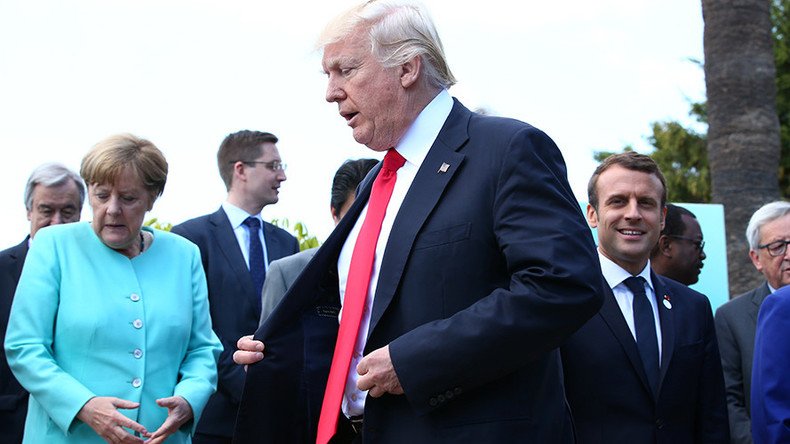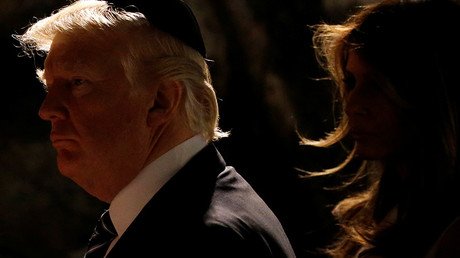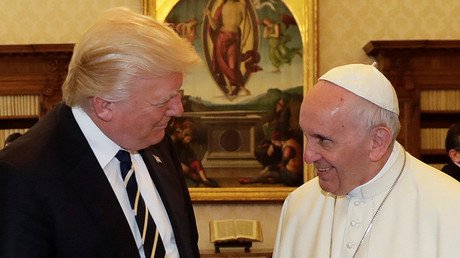One chance to make a first impression – and Trump blew it

It was US President Donald Trump’s first foreign trip since his election six months ago. Perhaps his abiding “achievement” from the nine-day tour of the Middle East and Europe was to reinforce the unflattering stereotypes about himself.
His itinerary which began in Saudi Arabia and ended in Sicily at the weekend was a tale of two visits. Trump was feted like a hero by Saudi rulers and on his next stop in Israel. He was evidently comfortable there and gushed with praise for his hosts. By contrast, during the European leg of the tour, the American president was met with a mixture of scorn, grimaces, and derision.
What does that say about this president? He is warmly greeted and lauded in Middle Eastern states whose records on human rights and violations are a stain on the world. Anywhere else though, he comes across as an insufferable sociopath.
Even during his supposedly friendly meetings in Europe, there was awkward ambiguity. When he met with Pope Francis in the Vatican, Trump was beaming radiant smiles for the cameras, while the pontiff glared with a stony face as if the pair just had a spat during earlier discussions.
Later, during the G7 summit of top rich nations held in Sicily, Trump was seen giving newly-elected French President Emmanuel Macron an “alpha male” handshake in which he nearly yanked off the younger leader’s arm. Trump may have intended to fool around in friendly locker-room style, but his behavior came across as less amicable and more erratically insecure.
Political armwrestling? Trump & Macron engage in fierce handshake battle during 1st meeting (VIDEO) https://t.co/IPSbJN6oTcpic.twitter.com/OnWFyumqTe
— RT (@RT_com) May 25, 2017
The European news media dubbed Trump’s general behavior as “boorish” and “rude.” He looked decidedly awkward among the other politicians, as if he wanted to get back on Air Force and enjoy the private comfort of munching on a ketchup-oozing hamburger, washed down with his favorite tipple of Coca-Cola.
A telling image was that of the other G7 leaders strolling amiably along the historic streets in the Sicilian resort town of Taormina. Trump held back and instead jumped into a golf cart to get to the lunch venue all the quicker.
At the G7 conference, there was no hiding the gaping distance between Trump and the other leaders, both in terms of policy and personal conduct. A communiqué consisting of just six pages – the briefest ever – was tangible proof that he found little to agree on with his counterparts from Canada, Germany, France, Britain, Italy, and Japan.
Trump’s egocentric view of the world as being always a “bad deal for America” ensured that there was no substantial agreement on issues of international trade, climate change, terrorism, and immigration. In the end, it was an embarrassing case of papering over the divergence between the US and other allies.
Stated commitments on countering terrorism and immigration, and on boosting economic trade were so vague in order to give the impression of common ground that such commitments will most certainly amount to more procrastination, and nothing practical.
On climate change, Trump persisted in hinting that he would rip up the US signatory to the 2015 Paris Accord, limiting greenhouse gas emissions. Granted, Trump moved significantly from his campaign rhetoric scoffing at the issue of climate change as a “hoax created by China” to disadvantage American economic competitiveness. At least in Sicily, he confined his skepticism to saying he would delay his decision to quit the Paris Accord.
German Chancellor Angel Merkel stretched diplomatic language to the limit, by describing the G7 talks on climate change as “very unsatisfactory.”
The low-point of Trump’s whirlwind tour was his stop in Brussels, where he addressed the 27 other leaders of the NATO military alliance. Speaking at an outdoor ceremony, Trump harangued the assembled leaders to cough up more military spending.
The US president said that if 23 out of 28 members were to meet a spending target of two percent of GDP on military – as previously agreed at a NATO summit held in Wales in 2014 – then that would generate a total extra $119 billion on defense spending. Only five NATO members make the two percent threshold: the US, Britain, Greece, Poland, and Estonia.
Several NATO states like Germany, the Netherlands, Belgium, and Italy currently allocate about one percent of GDP to military expenditure.
Trump is not alone among Americans as seeing these European states as “freeloaders” on US military power. But this president expresses the irritation in a particularly unvarnished way.
As he addressed the other NATO leaders, there was much shuffling of feet, grimaces, and even contemptuous smirks among the Europeans as if they were being scolded like errant schoolchildren by a headmaster – or perhaps bully – whom they had no respect for.
The Europeans argue that the NATO spending figure is only an arbitrary guideline and not binding. It is also arguable that the US is pushing for the extra input because it would primarily benefit the American military industry from new orders of F-16 and F-35 fighter jets, Patriot missiles, and Abrams tanks. In other words, Trump is seen as demanding, in effect, a European subsidy for the American military-industrial complex.
Germany stands out as the bane of Trump’s grievances with the Europeans. While talking with European Union chiefs in Brussels ahead of the NATO meeting, Trump slammed German trade practice as “very bad.” He accused Germany of dumping car exports on the US, while seemingly unaware that German manufacturers have invested heavily in building factories in his country.
Notably, Trump was at his happiest during the earlier visits to Saudi Arabia and Israel where he signed off on weapons deals worth up to $350 billion for American exports over 10 years. He seemed unconcerned by the implications from fueling such massive amounts of weaponry to a tinderbox region, and to regimes that are up to their eyes in sponsoring terrorist networks.
That suggests Trump has a very limited understanding of intricacies in international relations and problems. If human rights-abusing regimes buy American weapons, then he’s happy and all is “successful.” On the other hand, dealing with other world leaders where it involves discussions and understanding, then Trump adopts a glowering, bullying position.
A fleeting moment at the NATO summit illustrated Trump’s character. At one point, he was making his way to a group photoshoot. Without as much as a polite request or apology, Trump is clearly seen shoving the Montenegrin Prime Minister Dusko Markovic to the side in order to get ahead. Trump didn’t even look at the bundled prime minister or at onlookers taken aback by his aggressive manner. There was not a hint of shame about his uncouth behavior. Instead, Trump puffed out his chest, buttoned his jacket and obviously felt self-satisfied to be a “winner.”
It all comes down to a crude bottom line for Trump. Give me money, and you’re a fantastic guy. Anything less, and you’re an obstacle to be pushed aside.
This is just a guess, but when his wife Melania snubbed Trump’s hand at various times during the foreign visit, it was probably because he had been a huge, self-centered pain in the neck while traveling between stops on Air Force One.
The statements, views and opinions expressed in this column are solely those of the author and do not necessarily represent those of RT.















